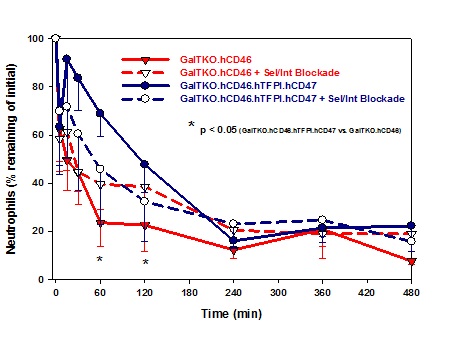Xenogeneic lung perfusion using GalTKO.hCD46 lungs expressing hTFPI and hCD47
Lars Burdorf1, Zahra Abady1, Margaret R. Connolly1, Benjamin Cerel1, Kaitlyn Petitpas1, Shannon Pratts1, Carol J. Phelps2, Will Eyestone2, David L. Ayares2, Agnes M. Azimzadeh1, Richard N. Pierson III1.
1Center for Transplantation Sciences, Massachusetts General Hospital, Boston, MA, United States; 2Revivicor, Inc, Blacksburg, VA, United States
Purpose: To address known xenogeneic rejection pathways, various genetic modifications have been introduced into donor pig lines. Here we evaluated whether tissue factor pathway inhibitor (TFPI), a protease inhibitor which blocks initial steps of the extrinsic coagulation cascade, and human CD47, a “don’t eat me” immunoregulatory protein, lessen inflammation and promote GalTKO.hCD46 lung xenograft survival.
Methods: In a well-established ex vivo lung perfusion model, 8 GalTKO.hCD46 and 9 GalTKO.hCD46.hTFPI.hCD47 lungs were perfused with freshly collected heparinized human blood. All lungs were treated with an anti-GPIb Fab, 1-BIA, a thromboxane synthase inhibitor and Famotidine; and donor pigs were pre-treated with Desmopressin to reduce vWF expression. In both groups, 3 or 4 lungs in addition received selectin and integrin blockers. Organs were perfused for up to 8 hours or until the lung failed.
Results: All except two GalTKO.hCD46 organs (183, 440 min) ‘survived’ until elective termination after 8 hours of perfusion. While the pulmonary vascular resistance (PVR) remained low with both genotypes, additional selectin and integrin blockade lowered PVRs in both groups. Neutrophil but not platelet sequestration and activation were reduced during the first 2 hours in association with hTFPI.hCD47 expression; this trend was more pronounced in the absence of selectin and integrin blockade, reaching significance at the 1 and 2 hour time point. Further biochemical analyses are underway.
Conclusion: While the expression of hTFPI and hCD47 showed a trend toward protective effects (improved survival, delayed neutrophil sequestration), overall lung physiology and hematological analyses did not demonstrate significant improvements. Lack of improvement of parameters other than PVR with addition of selectin and integrin blockade suggests that other injury pathways (e.g. non-gal antibody; cytokines; coagulation pathway dysregulation; GPIIb/IIIa-driven platelet activation) contribute to xenolung injury. Identifying and addressing these factors may be necessary to reveal effects attributable to hTFPI and hCD47.

NIH U19 AI090959. Unrestricted educational gifts from United Therapeutics/ Lung Biotechnology LLC.
There are no comments yet...